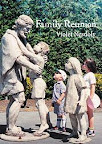Recently finished reading The Art and Craft of the Short Story by Rick DeMarinis. What a fabulously interesting book - if you can call a book on the craft of writing interesting. (I - strange person that I am - can!)
Unfortunately I didn't highlight most of it - just grabbed my highlighter towards the end, so really need to read it over to consolidate what I've learned.
Here are some insights I gained.
1. I may never feel proficient at writing short stories - he doesn't after writing hundreds.
2. He starts out writing just from some intriguing thing - from a free write or just because when you're a writer you sit and write and when you don't know what you're going to write about, you doodle on paper until something starts forming.
3. You don't, indeed, shouldn't have a preconceived notion of what your story is about - he quotes some truism - "If it isn't a surprise for the writer, it won't be a surprise to the reader." Here's what he says about that in the last chapter: "What you set out to do is not all that important. What is important is what develops along the way. The way is hard and my require many rewrites, but if there is something there in the first place, it will emerge.
4. You shouldn't force your story - but let it come to you. You shouldn't start out to make a point. "Sometimes your intuition will turn a story in a direction that disturbs you. You expected to do one thing, but now you're doing another. You had a plan, an intention, but it's been violated. You're now heading into uncharted waters. Chekhov criticizing a writer who wrote from a narrow agenda said, "He finds truth under the rock where he had previously hidden it."
5. Here's another good quote: "The short story is closer in spirit to the poem than it is to the novel. You can waste words in a novel and the novel will survive. You can never waste words in a poem or short story. Every word has to contribute to the final effect." P. 204 and "The short story, like the poem, can't afford even the mildest of false moves." P.197
6. Chapter 9 (p.171...) is an excellent treatment of "point of view," explaining the advantages and shortfalls of each.
7. In Chapter 8 (p.153) he explains so that I grasped it like never before, the structural parts of a story, calling them, "These are the fundamental bridge parts -- the cables, trusses and piers -- that span the chasm rim to rim." These parts are narrative, narrative summary and scenes. Of course bits of these can be interspersed within each other - a satisfying story is complex and seamless.
So, I think I need to reread this book, highlighting sections all along the way. Predictably, this book makes me want to try my hand at writing stories (fictional) again. And someday I may. Only, I don't want it to be in the confines of a deadline in a fiction forum where I feel pressure to come up with something, must share it with others and will most likely feel embarrassed by what I produce. I think I'm in Mr. DeMarinis' camp - writing a short story for me is a major undertaking, that can take years, and that I do primarily for myself.
His assertion: "You shouldn't start out to make a point..." makes me wonder - is it even possible to be a Christian fiction writer under these conditions? Or do one's Christian's beliefs constitute the atmosphere of the story - its very universe, its laws of time and space, of gravity and seasons within which the story plays out. A universe where the Christian part is not even negotiable. Where one doesn't set out to convince, but to tell a story and let the ash settle where it will after the eruption? In some ways, I can't even conceive of a Christian story that doesn't come off sounding in some ways like propaganda.
(PS - here's a story I wrote - a kids' one)
Tuesday, December 14, 2004
writing short fiction
Subscribe to:
Post Comments (Atom)

2 comments:
This sounds like a good book, violet. Would it be suitable for my 15 year old daughter to read? She's currently reading a memoir by Pierre Berton about writing, but he focuses a lot more on non-fiction, as opposed to fiction.
Kim, I enjoyed it immensely, and I'm sure your daughter would learn a lot from it. I think, though, you should look it over before you give it to your 15-yr. old. The author does include some complete short stories of his - which are definitely targeted to adults.
Post a Comment